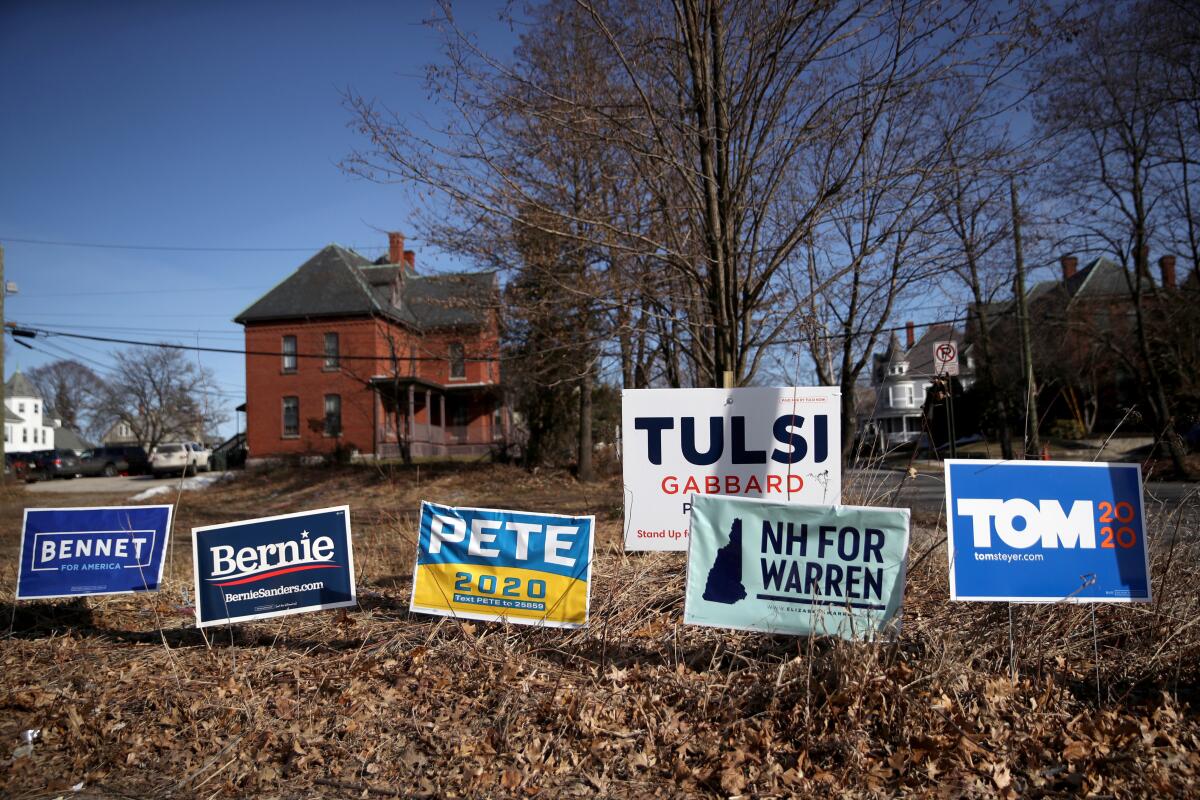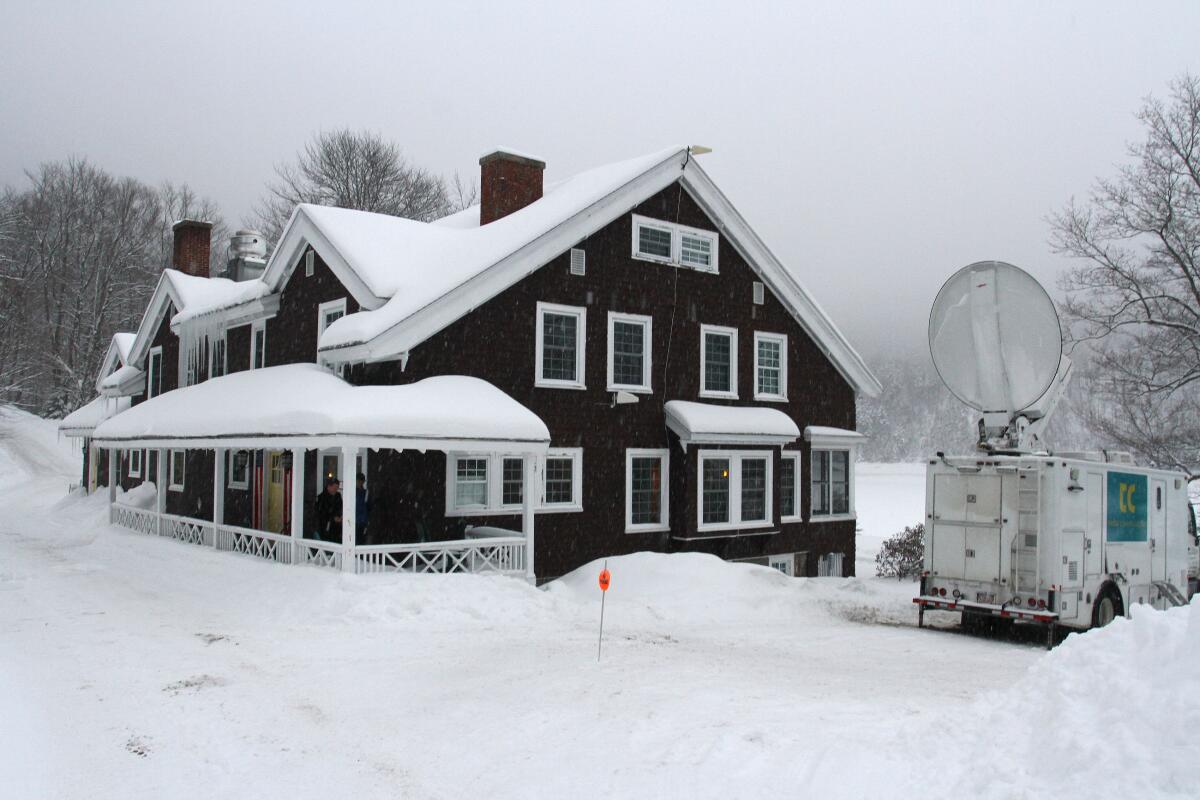With hours to go, New Hampshire primary voters just can’t make up their minds

- Share via
LEBANON, N.H. — They’ve been pummeled by millions of dollars in TV ads, had repeated chances to see the major candidates up close, sometimes in neighbors’ living rooms, and they’ve watched debates play out on television. Now, they’re about to cast ballots — but for whom?
“I don’t know yet,” said Sarah Glass, a high school teacher from Hanover, N.H. “I’m super-undecided.”
Standing a few feet away, in a Lebanon high school gymnasium where Sen. Elizabeth Warren (D-Mass.) was due to speak, Doreen Somers of Grantham acknowledged similar indecision.
“It’s tough. It’s exciting. But it’s tough.”
New Hampshire’s voters are, of course, notoriously picky — spoiled, some would say — as a result of the attention they get every four years. But this year’s indecision appears to go deeper, with many voters appearing almost paralyzed, not just by the breadth of choices they face, but by the weight of the stakes as they struggle to find a candidate they believe can beat President Trump.
“I had a stress dream the other night where Bernie Sanders was there,” said Anne Johnakin, a first-year student at Dartmouth College who turns 18 on primary day. Even in her dream she couldn’t make up her mind.
“In the past couple months, I’ve made a decision, then changed my mind, then made a decision, then changed my mind,” she said. “So, honestly, it’s right down to the wire.”
The number of Democratic primary voters who report uncertainty about their choice is significantly higher than four years ago, when the primary featured a relatively straightforward binary decision between Vermont Sen. Sanders and former Secretary of State Hillary Clinton, said Patrick Murray, director of the Monmouth University poll, which has repeatedly surveyed voters here.

Fewer than half the state’s voters in Monmouth’s most recent survey said they had their minds firmly made up. By contrast, about 60% said so four years ago.
The level of indecision among Democratic voters more closely resembles that of Republicans four years ago as they confronted a large field of candidates, Murray said.
The dynamic of the Democratic contest is like that Republican one in at least one other respect: Voters who favor Sanders firmly stand with their candidate, much as Donald Trump’s backers did, while support for alternative candidates has less intensity, said David Paleologos, director of the Suffolk University Political Research Institute in Boston, which is running a tracking poll of voters here.
The voters most likely to have not made up their minds represent key blocs of the electorate, Paleologos said: independents, who can vote in the state’s Democratic primary and likely will make up more than 40% of the turnout, those who describe themselves as “somewhat liberal” and those in the middle of the age range.
With younger voters heavily leaning toward Sanders, it’s the 36- to 45-year-olds who are most unsure, Paleologos said, noting that the rate among them is “unusually high.”
But indecision comes in all ages.
Debbie Leavitt, 64, and her husband, Dick, showed up at a Sanders event in Rochester on Saturday interested but worried.
Debbie, a retired French teacher, and Dick, a retired pastor, describe themselves as firm progressives, like Sanders. But they worry about what voters elsewhere will think.

“We like all of Bernie’s positions, respect him tremendously, went to school in Vermont, know what he did in Burlington,” she said.
“I am just nervous about what Trump will do with the socialist label. I know Bernie will do his best, but I think there are a lot of people who will be scared off by that.”
That line of argument, in which voters tie themselves into knots analyzing not just who they like best but what they think other voters will think, has stood out this year among Democrats desperate to find a champion they believe can vanquish Trump.
“It’s a classic case of trying to choose between what my heart would choose and the practical side that wants to beat Trump” above all else, said Glass, the high school teacher waiting Sunday night to hear Warren.
Her heart would counsel her to go with Warren, or Sen. Amy Klobuchar of Minnesota, whom she admires.
But, she said, “I hear skepticism from other folks” about whether either woman could “gain enough traction.”
“I think gender’s wrapped up in it, for sure,” she said, and that clearly bothered her. But in the end what really matters, she said, is to find a candidate “who can really stand up against Trump’s sheer immorality” and the negative general election campaign she expects he will wage.
Another factor is that Democratic voters, by and large, have positive feelings toward most of the candidates, making it tough to eliminate any of them.
“I like a lot of things about a lot of them. There’s not one that I don’t like,” said Lorraine Connell, 43, an independent who teaches high school chemistry.
“That’s the hardest part for me, in that I feel there’s a lot riding on my vote and” — she laughed — “I’ve never felt this much pressure on whether I’m really making a good decision.”
Another element that contributes to voters’ indecision is the size of the field: There are 11 major Democratic candidates still in the race, 10 of whom will appear on the New Hampshire ballot. (Michael R. Bloomberg timed his entry into the race too late to get on the ballot here.)
That has left some voters feeling that they still need to learn about candidates who are virtually unknown to them.
“I want to hear more about what he has to offer,” said Jack Evans, an Army veteran who is an undeclared voter, waiting to hear Pete Buttigieg, the former mayor of South Bend, Ind., speak in Merrimack late last week. “I’m not 100% sold.”
“I don’t want to go too far left,” said Evans, who voted in the GOP primary in 2016 for former Ohio Gov. John Kasich. He also found Klobuchar and Andrew Yang appealing, he said, but former Vice President Joe Biden was “past his prime.”
Kate Davidson attended a Biden rally in Concord last week while carrying a tote bag emblazoned with Warren’s rallying cry: “Nevertheless she persisted.” She was still weighing her options.
Davidson, who is in her 20s, said she wanted to hear Biden because “I like he has the experience.”
“But he’s an older white guy, and I’d like to see more diversity in the White House,” she said, adding that she wanted to learn more about Buttigieg.
Then there are voters who want to go beyond issues to try to grasp something more transcendent about their candidates.
Denise Marden of Hooksett voted for Trump in 2016. Now she’s “looking for an alternative.”
“Trump just seemed like he was gonna be a big shaker and mover, and he’s done some things, but he’s done a lot of things that I don’t like,” she said. “I don’t like his immigration policy, he’s excluding too many people. I think he’s a racist.”
Some of the Democrats, however, go too far to the left for her taste.
“I would never vote for a person that forgives all student debt,” she said, referring to a position that Sanders and others have advocated.
“I would be ripped if people’s student debt was completely erased because I sacrificed a lot for my kids to go to school.”
She leaned toward Klobuchar, she said, in part because of her stances on issues, but also for something larger:
“I feel like she could be my friend,” she said. “I really see that she can bring people together. She has a good soul.”
Times staff writers Mark Z. Barabak, Evan Halper, Janet Hook, Melanie Mason and special correspondent Caroline S. Engelmayer contributed to this report from New Hampshire.
More to Read
Get the L.A. Times Politics newsletter
Deeply reported insights into legislation, politics and policy from Sacramento, Washington and beyond. In your inbox three times per week.
You may occasionally receive promotional content from the Los Angeles Times.











